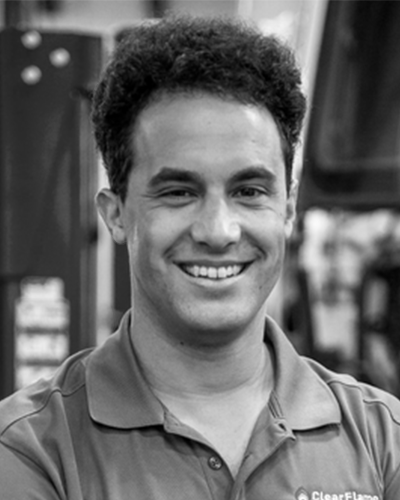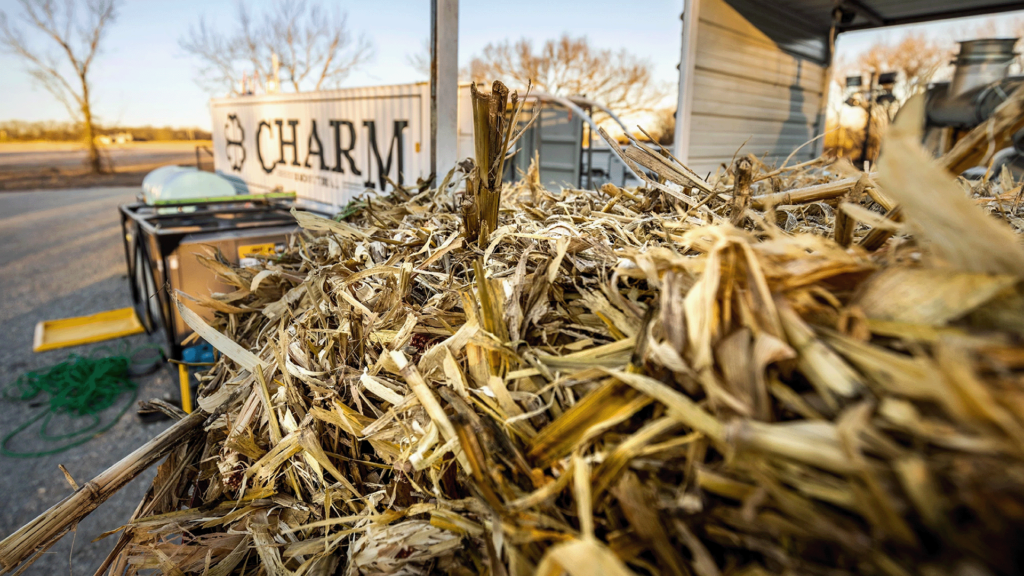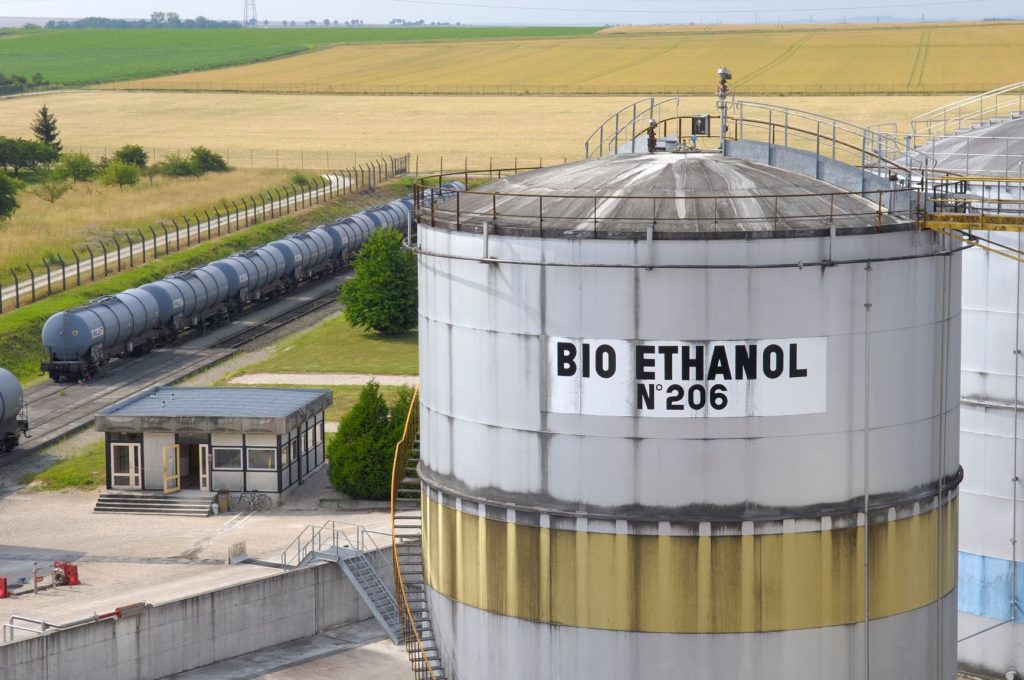Climate Now Episode 86
February 13, 2023
Decarbonizing diesel: cleaner fuels and engines
Featured Experts

BJ Johnson
Co-founder and CEO, ClearFlame

BJ Johnson
Co-founder and CEO, ClearFlame
BJ Johnson is the co-founder and CEO of ClearFlame, an engine technology company that is transforming heavy-duty diesel engines to run on cleaner fuels. He has a PhD in Mechanical Engineering – Energy Systems from Stanford University.

Chris Cooper
President, Neste US

Chris Cooper
President, Neste US
Chris Cooper is the President of Neste US. Prior to that, he was their VP of Renewable Aviation. Chris’ background is with the oil and gas industry. He previously worked with Chevron, Phillips 66, and Mercury Fuels.

Matt Leuck
Technical Manager, Renewable Road Transportation, Neste

Matt Leuck
Technical Manager, Renewable Road Transportation, Neste
Matt Leuck is the Technical Manager, Renewable Road Transportation at Neste. Matt has a background in engineering and sales in the oil and gas industry.
In this Episode
Electrification is going a long way in decarbonizing small vehicles (like passenger cars) in the global transportation sector, which produces about 16% of global emissions. But for long-haul transportation: trucking, shipping and the aviation industries, electrification is far from being technologically ready. Enter a controversial solution: biodiesel. Biodiesel is a fuel derived from organic matter like plants, algae or animal fats, which started to popularize globally just this century. However, early generation biodiesel had its drawbacks: first – they are not a perfect replacement for the fuels used in diesel engines, and can only be used as an additive to fossil diesel: decreasing, but not eliminating carbon emissions. Then there was the fact that clearing forest land to grow crops to make biodiesel could produce more emissions than just using fossil diesel.
Two companies: Neste and ClearFlame, are among a growing cohort of energy producers exploring more sustainable replacements to diesel fuels. We spoke with Chris Cooper and Matt Leuck (Neste) and BJ Johnson (ClearFlame) about the use of renewable liquid fuels, like renewable diesel that is made from organic waste (like spent cooking oil), that can be used as a 100% replacement for fossil diesel in engines. Stay tuned for Climate Now’s next episode, where we explore how renewable diesel is produced, how it compares in terms of environmental impact relative to fossil- and first generation bio-diesels, and how much and how fast the market for renewable diesels could grow.
Key Questions:
- What is renewable diesel? Is it really renewable?
- Does renewable diesel have emissions, and how do they compare to fossil diesel?
- How is renewable diesel being used today, and how might it’s use expand in the future?
Related Media:


Climate Now: Jan 16, 2023
Farm to stable CO2 storage
The agricultural sector produces about a tenth of the world’s greenhouse gas emissions, and while most of that comes from livestock (about 2/3), emissions from crop production still total about 2.2 billion metric tons of CO2-equivalent. Interestingly, we onl


Climate Now: Jan 17, 2022
The trucking industry needs to go green. Are electric trucks the answer?
In 2019, medium- and heavy-duty trucks accounted for about a quarter of U.S. transportation emissions while representing less than 4% of vehicles on the road, according to the U.S. EPA. It is clear the trucking industry must decarbonize in order for the transp


A Climate Change Primer Ep 6
Biofuels: An overview
Biomass – such as corn or switchgrass – can be converted into liquid transportation fuels, or biofuels. Biofuels are attractive because they result in significantly fewer emissions than fossil fuels, but they come with their own set of challenges,


Climate Now: Aug 2, 2021
Clean Aviation Fuel with Steve Csonka
What incentives are needed for airlines to adopt sustainable aviation fuel (#SAF) and decarbonize air travel? How does SAF get tested and approved for use in commercial aviation? Who are the players in this space now and how much SAF is already being used? Ste


Climate Now: May 2, 2022
The bottom line on sustainable shipping: Can the shipping industry reach zero emissions?
If the international shipping sector were a country, it would be the sixth largest CO2 emitting nation in the world. Every year, 11 billion tons of goods – about 80% of all the goods we use or consume – reach us by ship, emitting nearly a billion t


Technologies Ep 2
Clean Fuel: Jet Fuel
Aviation is responsible for 2.5% of global greenhouse gas emissions, though this figure is expected to grow as developing parts of the world become wealthier and increase demand for air travel. Experts have looked to sustainable aviation fuel (SAF) to decrease


Mini Explainer Series Ep 3
Global shipping industry emissions
How big of a climate problem is the shipping industry? If the international shipping sector were a country, it would be the sixth largest emitting nation in the world. Every year, 11 billion tons of goods – about 80% of all the goods we use or consume &#
Episode Transcript
Summary:
Interview highlights:
– BJ tells us why ClearFlame is focusing on vehicles that run on diesel: shipping, agriculture, construction, and mining all run on diesel. Most of the world’s developing populations also rely on diesel. The thesis of ClearFlame, BJ says, is to create a “cost effective, scalable, easy to adopt solution that can improve people’s lives across the globe without compromising our environment.”
– Matt Leuck, Neste’s Technical Manager, Renewable Road Transportation explains why renewable diesel is considered “renewable.” Rather than “taking carbon that’s been sequestered underground for hundreds of millions of years,” like the petroleum industry, Neste takes carbon out of waste from “plants or animals or other stuff,” that’s already above ground. Note: carbon is still released from burning renewable diesel, and lifecycle emissions are still “more than zero” according to the EPA.
– Chris Cooper, President of Neste US, talks us through the company’s feedstocks: used cooking oils and residues (including from palm which Neste says it plans to discontinue), and also how they expect technology to advance in ways that will allow them to convert other feedstocks such as: agriculture waste, forestry waste, and algae.
Transcript:
James Lawler:
Welcome to Climate Now, a podcast that explores and explains the ideas, technologies, and the practical solutions that we’ll need to address the global climate crisis and achieve a NetZero future as quickly as possible. I’m James Lawler, and if you like this episode, please leave us a review wherever you listen to your podcasts, share this episode with your friends, or tell us what you think at contact@climatenow.com. We love to hear from our listeners. In today’s episode, we’re taking a look at what is known as renewable diesel, a fuel that is made from organic waste, like used cooking oil and agricultural byproducts, and we’ll discuss how it can be used to mitigate hard to abate climate impacts of the trucking industry in particular. We’ll speak with Matt Leuck and Chris Cooper of Neste, one of the leading producers of renewable diesel and other biofuels across the globe, along with BJ Johnson of the company, ClearFlame, a company working to retrofit diesel engines to allow them to run on a wide range of cleaner fuels. But first, let’s get to our news segment this week in Climate News.
This week in Climate News, I’m joined by Julio Friedmann. Julio, great to see you again.
Julio Friedmann:
Delighted to be here as always.
James Lawler:
What’s new this week?
Julio Friedmann:
Perhaps we should start with the State of the Union. Let me say that he highlighted the climate provisions in the Inflation Reduction Act rather strongly, and he talked about them again in his favorite context: jobs, jobs, jobs, in terms of the possibilities of America and that climate change is driving us to create new opportunities by looking at new sectors and new possible technologies. He talked about solar and heat pumps. He talked about wind, he talked about hydrogen. It was terrific to see that kind of highlight.
We did not have that in prior State of the Unions. We did not have that even in the Obama administration, much less the Trump administration. So Biden is really putting forth a vision for America in which climate change and wealth creation work hand in hand to create opportunities.
James Lawler:
And that’s such an important message I think. Among the effects of the IRA should be lower utility bills, you know, creating more jobs. And I think a hundred thousand jobs have been created since the IRA passed last August, according to a recent analysis by the organization, climate power, and certainly there should be a lot more coming.
Julio Friedmann:
Indeed. But in part because of who the President is, he really cares about kitchen table issues. And so we talked about the fact that cleaning the grid would actually make energy costs go down, and that’s a message we can’t say often enough.
James Lawler:
Another interesting story this week that we saw was the latest development in the sort of slow march to what appears to be approval of a massive lithium mine in Nevada. This is the Thacker Pass Lithium Mine Project, that is being developed by Lithium America’s Corporation. And this, this project has been sort of in planning phases for, for many years.
In the most recent ruling the judge dismissed a variety of arguments made by the mine opponents, including concerns about groundwater, aquifers, and air quality. And really the, the dismissal was not that, you know, these things don’t matter, but rather that a jurisdictional decision effectively that the Bureau of Land Management would, and their, their various regulations would prevent this, you know, this mine from violating state water quality standards or, or other environmental standards.
So these developments, while not a green light yet for this mine, which should produce roughly enough lithium every year for the manufacturer of a million passenger vehicles is probably a, a positive step towards an eventual approval.
Julio Friedmann:
So first of all, I sincerely hope this mine gets built. Not only should the United States carry some of the environmental burden for lithium production, which currently we don’t, but also back to the IRA again, there are made in America provisions.
If we actually want to get the electric vehicles built, having a US lithium mine will help get more deployment more quickly. I do not know if this decision will count as precedent or not, but we’re gonna need more than just lithium mines. We’re gonna need copper mines, we’re gonna need rare earth element mines. We are gonna have to get these materials made in the United States. And in the State of the Union the President talked about secure supply chains. That he doesn’t ever want the US to be vulnerable to supply chains from other countries. This is what that looks like. It is also what wartime footing looks like.
People have asked for wartime footing for climate. That includes new lithium mines in places like Nevada. And so these kinds of conflicts and these kinds of questions are going to be part of the landscape for many, many years to come. Finally, there was a story I saw that looks like a preview of coming attractions in the United States.
In Europe, they’re having a hard time getting agreement across the European Union on what constitutes green hydrogen. And a few months ago it looked like there was a breakthrough in which Germany would accept nuclear energy as one of the feeds for green hydrogen production. France has 70% of their power is nuclear, and so they were keen to see that happen.
It seems like there’s still friction in the European Commission around these kinds of questions, and Germany and France have been making objections of various kinds. I’m sorry, and Spain as well. What happened this week was essentially a commissioner in charge of these things hastily withdrew a planned meeting.
He said, you know what, we’re not gonna talk about this. And the response was, what do you mean we’re not gonna talk about this? But in point of fact, it gets at the heart of these kinds of challenges. Green hydrogen is not just a climate challenge for Europe. It is a way for them to reduce rapidly dependence on Russian gas in the wake of the war of Russian aggression against the Ukraine.
Inability to reach consensus on what clean is is actually hampering their national security as well as their economic development plans. But as people square off, is blue hydrogen clean or not? Is green hydrogen clean or not? Is nuclear allowed? Is hydro allowed? These sorts of things will diminish the pool of options and they will definitely slow things down.
If in the United States those become the target of future lawsuits. It’ll slow things down even further.
James Lawler:
Thanks, Julio. One more story, just that, that caught our attention this week was a story that we saw about the Korea gas corporation, abbreviated KOGAS has hired a technical advisory firm, DNV, to assess the viability of blending hydrogen into South Korea’s transmission network for natural gas. South Korea has been taking a number of steps toward building a hydrogen economy in that country, including plans to create six hydrogen cities each of those cities to receive about 40 billion dollars over the next four years as they attempt to develop that infrastructure.
Julio Friedmann:
So, US infrastructure is pretty poorly configured for hydrogen blending. It’s entirely likely that Korean infrastructure is much better. It is newer. They have different materials. It’s managed differently, so they may be able to get quite a lot of blending because they do not have access to other kinds of renewable energy.
Things like clean hydrogen are important for them in terms of domestic heating, industrial heat, all these kinds of things. I do think that their interest in blue hydrogen is noteworthy, but misguided. There’s not gonna be a lot of places to store a CO2 around Korea. It’s just not geologically fit. So they’re gonna probably need more nuclear power if they really wanna make a lot of hydrogen, which is itself a politically fraught issue in Korea.
James Lawler:
Now for our interview segment. The main focus of our episode today is on renewable diesel. Is it really renewable? What is its emissions profile? How is it being used today? How much of it is there? We’ll be going in and out of our conversations with Chris Cooper and Matt Luke from Neste and BJ Johnson of ClearFlame to learn more about renewable diesel and other biofuels and their potential to help decarbonize industries like shipping, trucking, and aviation.
Founded by BJ Johnson and Julie Bloom Rider in 2016, ClearFlame is a company that is retrofitting diesel engines to expand the range of fuels they can run on, which could help shift the trucking industry away from traditional fossil fuels. Neste, on the other hand, was founded in 1948 as Finland’s National Oil Company.
Starting in the 1990s, Neste began to focus heavily on developing biofuels like renewable diesel, and today is one of the world’s largest producers of this fuel. Chris Cooper is the President of Neste United States, and Matt Luke is the company’s technical manager of Renewable Road Transportation.
First, we will cover some of the basics such as what is renewable diesel? What differentiates diesel and gasoline? And what is the difference between renewable and biodiesel? Then we’ll discuss some of the raw materials that go into renewable diesel and how these can be sourced in a sustainable way. Finally, we’ll outline some of the developing markets for renewable diesel and other biofuels, and how the fossil fuel industry is responding to the growing demand for renewable fuels.
We start our conversation with ClearFlame’s, BJ Johnson, to learn some diesel basics.
BJ Johnson:
Gasoline and diesel are fairly similar. They all come out of the same barrel of oil. So effectively what you’re doing is you’re taking that barrel of oil and you run it through a distillation column. You separate it out by kind of how complex the molecules are.
And so these are literally just coming out of different trays of a distillation column. The lighter molecules, things that have between four and twelve carbons, mostly around eight carbons tend to get pulled out in the gasoline tray, so it’s lighter, slightly less lubricious, more aromatics, harder to ignite.
Diesel is the slightly heavier, more oily version that comes a tray or two lower in the distillation columns. You know, C twelve to C twenty or so.
James Lawler:
I wonder if you could just give us sort of a primer on various replacement fuels for diesel. Let’s just start with biodiesel. What is biodiesel and why is it biodiesel?
BJ Johnson:
Yeah, so biodiesel is a diesel like molecule that you make from a biofeed stock. So predominantly it’s gonna be a lipid feedstock, a fatty, oily feedstock. In this country and most of the countries where it’s used, that means it comes from soybeans. So you take the soybeans, you extract the oil from them, do some chemical processes that if I try to name i’ll, I’ll butcher.
But basically get it close enough so that it somewhat looks like diesel. It is not identical to diesel. It’s actually one of the challenges with biodiesel, you really can only use it up to about the 20% level. So you blend it mostly into regular diesel, but it is the part of that you are using in a biological way, significantly lowering carbon than the petroleum base.
It’s challenges are soybeans are not the most feedstock producing crop. You don’t get that much fuel energy per acre. And then, as I mentioned, you have to blend it with petroleum anyway. That’s really it’s big challenge. That has led to the rise of something called renewable diesel which honestly biodiesel is renewable too, and it’s probably just a different name because that’s how marketing works, but it is also a different product in the end. Renewable diesel is actually molecularly identical to regular petroleum diesel. You can kind of think of it as if you were to take biodiesel and do a little bit extra kind of chemical work on it in terms of the, the synthesis to make it more identical to diesel.
It’ll make it more expensive, which it is.
James Lawler:
Mm-hmm.
BJ Johnson:
But it will also make it a direct drop in replacement. So you can use renewable diesel directly as a substitute for regular petroleum diesel. The challenge with renewable diesel is it has all the same feedstock limitations as as biodiesel. It’s great if you can make it from animal fat. It’s great if you can make it from waste oil. It’s only okay if you’re making it from soybeans and it’s bad if you’re making it from like palm oil or something.
James Lawler:
Right.
BJ Johnson:
So you really gotta be careful on the feed stocks, and it is a very process intensive production. It is not cost competitive with regular diesel right now, and it’s, it’s still very subsidy reliant.
James Lawler:
Okay, so renewable diesel is a direct substitute for petroleum diesel. Why does your company ClearFlame focus on diesel as opposed to regular gasoline?
BJ Johnson:
In the fifties and sixties, most of the trucks on the road in the US were gasoline trucks. But when fuel prices began to become a problem, the 15% to 20% more efficient that diesel engines are was 15% to 20% lower operating costs.
In a matter of decades the entire sector changed to be run by diesel. Same is true in agriculture, construction, mining, most other commercially oriented sectors. Most of the world’s population lives in developing economies. And then the access to goods and electricity that diesel engines provide is actually critical to improving their quality of life and their, and their standard of living.
And we need to find a way to increase energy access in a way that is still fundamentally sustainable, and that became the thesis behind ClearFlame. How do we get a cost effective, scalable, easy to adopt solution that can improve people’s lives across the globe without compromising our environment?
James Lawler:
Hmm. So let’s talk about what that technology is. So what exactly is ClearFlame?
BJ Johnson:
ClearFlame is, you can think of it as a set of modifications that you can make to a diesel engine to make it fundamentally fuel agnostic. So when I was talking about making people’s lives better with engines, that is a characteristic of the diesel engine design.
There’s a reason it dominates the applications. It does, it’s high torque and efficient and powerful, and has rapid demand response. The association, the negative associations with diesel engines are actually related to the petroleum diesel fuel that is used in it. And so ClearFlame’s technology, we change about 10% to 15% of the parts of the engine.
We’ve proved that you can do this as a retrofit, so we’ve retrofitted existing engines. We’re working with one of our investors, John Deere, to make this new OEM product too. But when you, when you integrate the hardware and software changes of our system, you can run the diesel engine, you can deliver all of its economic value, but running on a decarbonized liquid fuel like an ethanol or methanol or even long-term ammonia, which is not only gonna drive down your costs, which is important in these cost conscious sectors, but also reduce emissions and emissions broadly. Not just the CO2 we were just talking about, the greenhouse gas, but also the criteria pollution, the sut and smog that kills people on the ground.
James Lawler:
Hmm.
BJ Johnson:
Diesel, the reason why you use diesel fuel on the diesel engine is very easy to ignite.
Ethanol and methanol are harder, but at its heart, our technology is as simple as if you get it hot enough, anything burns. So we basically take that standard compression process, make it hotter so that you can still spray a hard to ignite fuel in, and you run the diesel cycle.
James Lawler:
So you’re focusing on diesel engines because of their prevalence as engines that humans use.
What kinds of fuels are alternative to diesel fuels that would produce lower emissions? And does ClearFlame have anything to do with innovating those, or it’s just focused, you guys are just focused on the engine hardware?
BJ Johnson:
It’s a bit of both. We are focusing on making the question itself, you’re asking less restrictive.
So in the absence of ClearFlame, what types of lower carbon fuels work in a diesel engine? Well, the answer to that is you have to figure out some way to make a synthetic or bio-based renewable, something molecule that looks like diesel. We have things like biodiesel today. We have things like renewable diesel today.
You could synthesize diesel from renewable energy if you really wanted, but ClearFlame’s vision is that that’s an unnecessary constraint. As I mentioned earlier, the differences between the fuels, diesel tends to be the biggest and most complex molecules you see in a liquid fuel, so they’re very hard to produce biologically or artificially, and so their feed stocks are limited, their production capacity is limited, and they’re expensive.
ClearFlame, what we said is we want to be able to use any fuel in a diesel engine. We want to be fuel agnostic. And if you can do that, you don’t constrain the fuel ecosystem to say, make me a fuel that works in my engine. It’s a partnership. We’re saying we’re gonna make an engine that will run on any fuel and you fuels folks, you innovate and try to figure out how to make a liquid fuel that is as low carbon and cost effective as possible.
And so the innovation that’s happening today in fuels, I would say is not because of ClearFlame, but because of ClearFlame, we will be able to innovate on fuels in a much more end-user focused manner. Focused on scale and economics and carbon intensity, not chemical properties, because that’s not the end goal, it’s a means.
James Lawler:
As BJ mentions, different types of fuel from gasoline to diesel to biodiesel can have different emissions profiles, and therefore environmental impacts depending on the makeup of the fuel and how it is burned. Here’s Matt from Neste on the emissions associated with diesel combustion.
Matt Leuck:
So all combustion has kind of the same emissions components just at different levels. A big one back in the, in the seventies was sulfur dioxide sucks, right? Cuz that’s what led to acid rain.
James Lawler:
Mm-hmm.
Matt Leuck:
So the fuel got cleaned up and you really cut down the, sulfur emissions from engines, which helped a lot. There’s particulate matter which most people see a diesel engine, like an older one that’s the black soot coming outta the tailpipe, right? Gasoline’s not gonna make nearly as much of the particulate matter as a diesel might. There’s NOx or oxides of nitrogen. That’s a really big component that people are talking about today because that’s a, it’s right there at the tailpipe. It can affect the local environment, right?
James Lawler:
Mm-hmm
Matt Leuck:
But with current, on, on a gasoline side, you have your, your catalytic converters, and on the diesel side, you have selected catalytic reduction, another component that reduces NOx.
James Lawler:
For some additional context both NOx and particulate matter generated in the combustion of fuels from diesel to natural gas can compose serious threats to human health.
NOx and particulate matter have been associated with increased risks of asthma and lung cancer. NOx gases also contribute to both acid rain and climate change. Wonderful stuff. Anyway, here’s Matt again.
Matt Leuck:
The latest generation of diesel engines and gasoline engines are incredibly clean. I mean, a diesel engine now compared to 15 years ago, the NOx and the pm, particulate matter are both down, you know, 98, 99% from where they used to be.
James Lawler:
Interesting. So those are some of the local air pollutants associated with diesel fuel. Now I’d love to talk about some of the climate impacts. When any carbon-based fuel, like diesel is burned, it releases greenhouse gases. So why do we even use the word renewable in the term renewable diesel?
Matt Leuck:
Sure. So think about the water cycle, right?
We have water that goes to the clouds, and then it rains, and then it evaporates and goes back into the clouds and it’s all right there. That’s what we are doing, but with carbon.
James Lawler:
Mm-hmm.
Matt Leuck:
So rather the petroleum industry is taking carbon that’s been sequestered underground for hundreds of millions of years and when we combust that and use the energy, we’re, we’re putting more carbon into the atmosphere.
And an analogy I use sometimes is, think of it like a sponge, right? You can only fill a sponge so much.
James Lawler:
Mm-hmm.
Matt Leuck:
And then bad things can happen. Whereas like the carbon cycle analogy there, we’re using biogenic carbon. So we are taking carbon that has been above ground recently, whether it’s in plants or animals or other stuff, taking that waste, pulling that carbon out and putting it back into the atmosphere. So we’re ringing out the sponge and refilling it and ringing it out and refilling it rather than trying to pump more into it.
James Lawler:
Fuels drive from organic matter are broadly referred to as biogenic fuels or biofuels. The emissions attributed to these fuels over their production and consumption are referred to as lifecycle emissions.
According to EPA estimates, lifecycle emissions for renewable diesel are typically less than fossil diesel, but are still greater than 0. But as BJ described earlier in our conversation, these emissions estimates vary significantly based on how the fuel is made and what it is made from. For example, if hydrogen is used to create renewable diesel and the hydrogen is made using fossil fuels, which is typically the case, it is much more dirty than renewable diesel made by green hydrogen.
That’s why ClearFlame is retrofitting the diesel engine to accept cleaner fuels. Neste is one of those companies innovating to create cleaner fuels to help us better understand the feed stocks that Neste uses, here’s President of Neste, United States, Chris Cooper.
Chris Cooper:
Neste has made a concerted effort to, to specifically develop this production out of waste oils and residues.
And so those would be in the form of used cooking oils, animal fats, tallows right? The yellows, brown greases. Now, these may sound like technical terms, but this is the waste, right, that goes out of the, out of the back of our food preparation and or our restaurants after our french fries, donuts, or, or other products are produced.
So what we call these are waste and residues. Neste is not competing with food or feed for the purpose of creating energy. We use many different raw materials about, you know, over 10 different raw materials that, that make our renewable product a small portion of that. Residues come from the palm industry.
In the early days, our industry was based on easy access to products such as,you know, palm oils. And, and again, the residues left behind as a result of the, the large palm industry. But it’s important to understand the difference between palm oil and what we call PFAD or palm fatty acid distillate.
And the PFAD is the, is the processing residue from the refining of food grade palm. And so again, it’s, it’s a, it’s a waste oil, a residue. But 2023 Neste plans on completely stopping its use of palm oil in the supply chain, it will continue to use the waste streams derived from it because there certainly is value and it’s important to realize that, that these all fit into this waste and residue category.
But our view is simple as a company, but we can only use feedstocks that can be sourced in a way that protects human rights.
James Lawler:
And I want to, so, you know, palm oil production has been identified, you know, one of the greatest threats to the remaining rainforest on Earth today. And obviously any, any price that you put on kind of any component of that value chain, whether it’s the primary component or downstream component, buttresses the market for that oil.
So it’s supportive whether you know, directly or indirectly of the activity that we’re talking about. And so I’m wonder to what degree that impacts Neste’s strategy.
Chris Cooper:
Deforestation is hugely important to us, and we have a, a very strict supplier code of conduct. And we wanna know what is the effect that they’re having or have had in this space of deforestation.
So it’s important to us to pay attention to that as we continue in the use of palm or its derivatives. This is a product that’s in production, not for the human consumption, and nor is it a product that we believe is driving deforestation as far as we’re able to participate. What Neste believes it’s done is, is led in this space of creating transparency and helping, the rest of the world see where it can appropriately be used and properly be used. And when it becomes inappropriate, we’re certainly compliant to a hundred percent and want to find that we’re working together with the industry to provide a proper product to the market.
James Lawler:
The U.S. EPA has identified that the amount of waste cooking oil available could be a limiting factor in scaling up renewable diesel.
As other companies in the energy space start to create their own renewable fuels, is the amount of feedstock a problem?
Chris Cooper:
We do believe that this energy transformation can depend on these feedstocks, but that’s today as we continue to expand the conversion of renewables into our energy stream. We must realize technology’s gonna play a huge role even in this space.
So today, where we’re using waste oils and residues, we need to be continuing in our efforts as we have in the development of lignocellulosics. And that’s really the conversion or the ability to take forestry waste and agriculture waste to convert to these types of renewable products and feed stocks as well as algae. And algae we’ve found through our technology groups that we have a, a tremendous opportunity as we develop in this space to convert algaes to energy as well as power to liquids, which is a pretty exciting technology using green hydrogen and, and merging with CO2 in a pretty amazing way.
James Lawler:
Now we’d like to transition back to our conversation with Matt to learn more about the developing markets for renewable diesel.
Matt Leuck:
Here in the US, it’s the West Coast, basically because of the carbon programs that make it more beneficial for us. So California has their low carbon fuel standard. Oregon has their Clean Fuels program, things like that. And we we’re kind of keeping an eye on the rest of the country as their, as their legislation changes. The fuel we make in places that have those carbon markets, we can go in and sell near parody with our fossil competitor, right?
We can sell close to a fossil diesel price with fluctuations based on logistics and things. In California for example, if someone were to bring fuel into the state, there’s a mandated ghg reduction year over year that you have to be below, right?
If you’re, if you’re below the line, you generate credits. If you’re above the line, you’re deficit credits. You have to buy them from someone like Neste. Our fuel feed stock wise can be much more expensive than Fossil, or not it. We don’t track together. We don’t, we fluctuate a bunch, but to make up for some of that increased cost on feedstock, aggregation and everything else, we need to be in the markets that have those credits.
That’s why it’s advantageous to go there and not somewhere else because, you know, one transport out of California off the West Coast would cost extra money. But two, we’d be giving up the credit value that helps us offset production cost.
James Lawler:
So Matt, could you talk about the sort of the, the customer profiles, where is it used and how does it differ in terms of end use from, you know, traditional diesel or biodiesel?
Matt Leuck:
Sure. Renewable diesel can be used anywhere fossil diesel is used. It meets that same spec, right? So there’s no regulatory hurdles to get over. You don’t have to change your storage or, or anything like that, any hardware. In a vehicle, there are some actual tangible benefits for a fleet owner as well.
You know, whether it’s the fact that the chemistry of the fuel means it doesn’t attract water, which can be an issue for diesel fuel. The combustion itself produces less byproducts, so you can extend your oil change intervals. A fleet owner will definitely not have as many issues with the diesel particulate filter, which is one of those exhaust after treatment systems that helps minimize emissions, like those could be giant headaches for fleet managers.
We have one customer on the west coast. They, they’ve told us that over the past 18 months, they’ve saved over $20,000 and they actually put it down to dollars and cents. They save 2 cents per mile.
James Lawler:
Hmm.
Matt Leuck:
Just because they’re extending those oil change intervals, they’re reducing maintenance and downtime by using a cleaner fuel that’s putting less deposits in their engines, less deposits in those exhaust systems. You know, 2 cents per mile may not sound like a lot, but when you start running a big fleet and running a lot of gallons it’s definitely a game changer compared to how things used to be.
James Lawler:
For those of you who’ve listened to our episode on electric trucking, Are Electric Trucks the Answer? You may recall that electric trucks could also have huge cost savings for fleet owners.
Along with their renewable diesel, Neste also produces sustainable fuels targeting other difficult to decarbonize sectors like marine shipping and aviation. Here’s Chris Cooper on some of those efforts.
Chris Cooper:
Renewable diesel is the most mature market that exists today around the world. And so we produce and sell the most of it worldwide.
But some of the neat innovations exist in aviation where sustainable aviation fuel or SAF as it’s known by the airline industry or aviation industry. You know, it’s a rapidly growing opportunity and we are, you know, we’re finding a home for every gallon of saf we produce. We also find that the airlines, whether the national and or again the global carriers were quick to adopt sustainable aviation fuel.
So the name of of the airlines is long. We found that the segments within the airlines as well from the passenger airlines that you know and use. The cargo airlines that we hear about that move our cargo in and out of the countries, they have been able to access saf in a meaningful way now through nesting.
And again, the business aviation. We have locations where we’ve partnered with companies Signature Flight Support, who’s the world’s largest service provider to the business aviation sector. They’re the largest consumer and distributor of our SAF worldwide. Marine fuels, also very exciting growth space.
Again, we know that the effect, just a small number of these vessels that travel our oceans have a huge impact. And so if Neste can participate through the conversion of its conventional facilities and refineries to produce these renewable marine fuels, we’re, we’re gonna be excited to be strongly driving and participating in that market.
So I guess I’d like to characterize that as the hardest to abate. We see that cars can take batteries. We see that heavy trucks can take batteries, but as Neste continues to work in this liquid fuel space we wanna be sure we’re helping those that are disadvantaged without the ease of conversion.
James Lawler:
As the energy transition shifts into full gear, the rise of the biofuel industry can give workers in the fossil fuel industry the opportunity to use their knowledge and skills to help develop this new, cleaner technology. Here’s Matt from Neste on how the company has benefited from this dynamic.
Matt Leuck:
The opportunities in the renewable space are fairly endless just because of all the growth.
We have quite a few people in our company, whether it’s on the commercial side, anywhere from, from a salesperson all the way to a vice president that have come from fossil fuel companies. Even over in Europe, a lot of our researchers are coming from those spaces because they’re familiar with the refining processes and chemistry, and chemical engineering and things like that.
Our company, we’re probably 20% technical R&D development type people. And that knowledge is not specific to the fossil industry, right? We’re work, we’re building hydrocarbons, and if we’re building the same stuff, all the same knowledge can apply anywhere. So yeah, I think there’s, there’s a lot of opportunity if people wanted to, to make that jump.
James Lawler:
Both Matt and Chris worked with traditional fossil fuels before coming over to Neste to work on renewable fuels. They’re part of a larger trend of workers leaving the fossil fuel industry, which is simultaneously struggling to recruit young people in part due to climate concerns. Here’s Matt again.
Matt Leuck:
I think a lot more people are starting to see the writing on the wall and voluntarily making the move.
So I think that industry may have a talent issue. It was always a joke, but you know, there was the crash in the eighties for the oil industry and there was a huge generational gap there. Yeah, the old guys and the young guys, but nothing in between really. If I were on that side of the fence now, I’d be scared that the young side just may not fill the gaps anymore.
James Lawler:
I was curious to understand more about how the larger energy industry beyond those folks who are producing renewable fuel are responding to Neste’s moves. Would you characterize it as observing from the sidelines or mad scramble to catch up?
Matt Leuck:
I think if I had to, to put my thought on it, I would say somewhere in between, because they do have their current industry or their current supply that they have to meet. Right? So they can’t just turn that off and get rid of their current fossil based production.
James Lawler:
Mm-hmm.
Matt Leuck:
But knowing the way the world is going, whether it’s legislative or just pressure from ESG or other things, everyone will end up having to go green. But you do see a lot more of the oil majors getting in. Chevron recently purchased one of our competitors. Marathon Petroleum out at the joint venture with us is getting into it.
James Lawler:
Mm-hmm.
Matt Leuck:
Shell over in Europe, they have their technology they’re using. ExxonMobil has developed their own renewable diesel production technology, E&I, there’s a lot of majors out there that they may not be investing large percentages of their wallet into it but it’s definitely not something they can ignore.
James Lawler:
That was Matt, Luke and Chris Cooper of Neste, along with BJ Johnson of ClearFlame, discussing the fast-growing biofuel industry. Biofuels like renewable diesel have significant potential to help decarbonize some of the hardest to abate sectors thanks to their ability to easily replace traditional fuels.
Responsible development of those biofuels will be necessary to realize their full decarbonization potential, while also ensuring they’re not used to perpetuate fossil fuel reliance. Now that’s it for this episode of The Climate Now Podcast. For more episodes, videos, or to sign up for our newsletter, please visit us @climatenow.com.
We hope you’ll join us for our next conversation.
Climate Now is made possible in part by our science partners like the Livermore Lab Foundation. The Livermore Lab Foundation supports climate research and carbon cleanup initiatives at the Lawrence Livermore National which is a Department of Energy applied science and research facility. More information on the foundation’s climate work can be found at livermorelabfoundation.org.